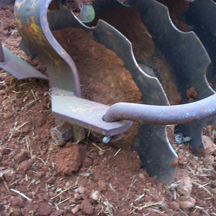A friend of mine who was/is really into Spencer rifles and carbines threw an interesting thought out at me a couple of years ago.
We all know the story of the Little Bighorn battle, but John had an interesting little twist. He thinks that one of the factors that led to Custer's defeat was firepower. I tend to agree with his line of reasoning.
Until the Black Hills expedition in 1874, the Seventh Cavalry was equipped with seven shot Spencer carbines. If I'm not mistaken, Custer held up the expedition until all of his companies could be re-equipped with the new 1873 Springfield. I don't think the Seventh was involved in any major actions during that expedition, or in the next two years leading up to the Little Bighorn Campaign. I think the War Department did away with the Spencers primarily because of range; the .56 caliber Spencer was a relatively short-range cartridge. From what I can understand from those with more engineering know-how than myself, the action/breech of the Spencer won't work with a longer cartridge case (I think that's the reason the repro's can't be chambered for .45 long colt). So a longer-range cartridge was not possible with the Spencer design.
During most of Custer's Civil War service and his Post-War service he commanded troops equipped with Spencers. He was accustomed to his troops having a tremendous amount of firepower.
At the Little Bighorn, his troops did not have that advantage. Since this was the first time the Seventh was involved in a major engagement since they had re-equipped, the difference in how many rounds a minute they could fire hadn't been tested in combat.
In an ordinary engagement (is there any such thing?) from that period, I don't think it would have mattered, but the sheer numbers that Custer's immediate command was facing swamped his five companies on the hill (dismounted, which means every fourth man was detached to hold the horses, for all intents and purposes taking away one quarter of his strength). There were not enough men to handle the angry Sioux who came boiling up out of the river bottoms. I don't know if the result would have been any different if he'd had the whole regiment with him.
I expect those boys thought they'd poked a stick in a hornet's nest.
Wilder's Brigade wrecked a couple of Confederate brigades at Chickamauga, primarily due to the firepower their Spencers offered them. They might have changed the outcome of the battle if Charles Dana (Assistant Secretary of War) hadn't came along... oh, well probably not, but that's a story for another time.
I realize there were many other factors to Custer's defeat, tactical and technical, but this struck me as good an explanation as any.
It's a good argument topic anyway.





<< Home